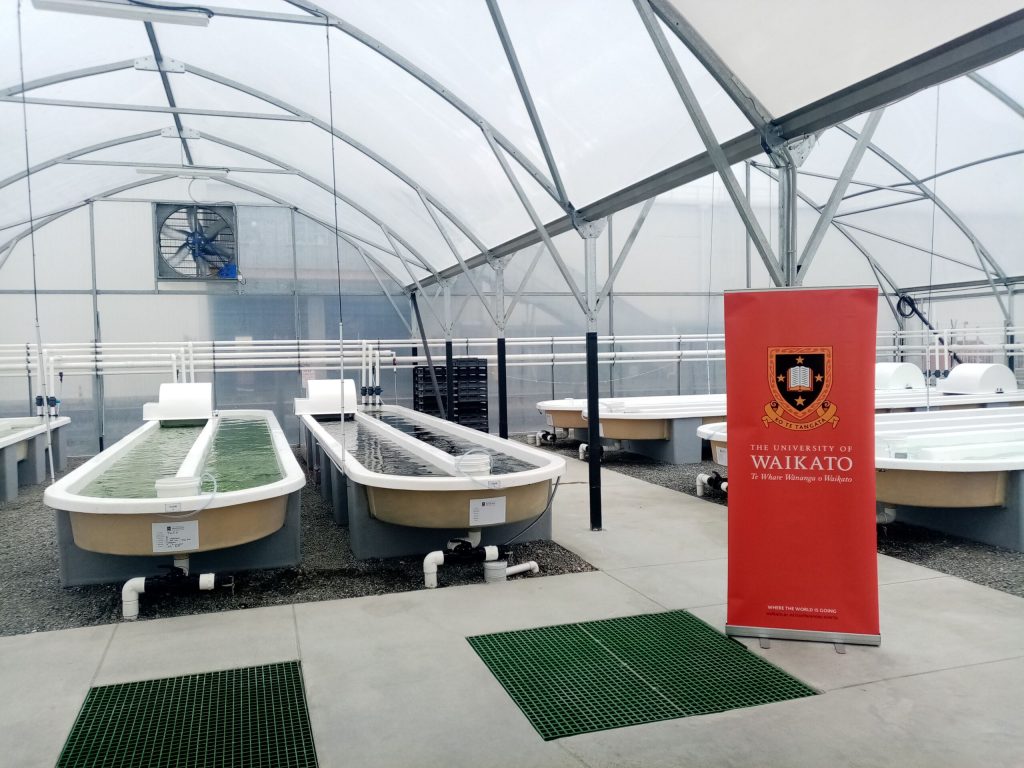
Features
How-to
Technology
New Zealand university launches new macroalgae RAS site
March 9, 2021 By Mari-Len De Guzman
 The Microalgae Research Facility at the University of Waikato in Tauranga, New Zealand (Photo: Fresh By Design)
The Microalgae Research Facility at the University of Waikato in Tauranga, New Zealand (Photo: Fresh By Design) The University of Waikato Macroalgae Research Facility in Tauranga, New Zealand, has officially opened its new Facility of Aquaculture Research of Macroalgae.
The cultivation research facility is focused on the development of sustainable technologies to enable the production of marine and freshwater macroalgae for biomass applications. This will ultimately deliver on New Zealand’s national targets to diversify the local aquaculture industry.
The university partnered with Fresh By Design (FBD) to supply and build the new facility using recirculating aquaculture system (RAS). The system is comprised of two identical, bespoke algae research systems for both fresh and saltwater use. These are all housed in locally sourced greenhouses using reverse cycle heat pumps for temperature control, according to information obtained from FBD.
The RAS facility will primarily grow freshwater alga Oedogonium and sea lettuce (Ulva lactuca), and will conduct research on the uses of the produced biomass, with focus on incorporating algal bioproducts for human and animal health and nutrition, as well as plant health and biostimulants and other materials.
“Fresh by Design were engaged at the vision conception stage to provide preliminary guidance which progressed to high-level design, engineering and construction for all the RAS and greenhouses,” said Chris Blake, from the university’s Entrepreneurial Universities Macroalgal Biotechnology Enterprises Programme. “Their expertise was critical when working with all other contractors to make effective decisions on the wider building, plumbing and electrical requirements to support the RAS systems.”
The facility has two RAS systems, each one containing six 7,000-litre high-rate algal pond tanks from Ajay Fiberglass, and six 1,000-litre Duraplas tanks. These systems include: direct CO2 control via FBD injection systems with PID control; RK2 foam fractionators; Ultra Aqua UV systems; Waterco Aquabiome filters, media filters with AFM media; Waterco pumps including builtin and stand-alone Vacon VFD control for the main system pumps; FSI bag filters; Oasis heat pumps; and FBD oxygen cones.
The system also required a dual intake water treatment system for saltwater and freshwater – also allowing for input of various sources of wastewater to test treatment and remediation options, FBD said. These intake systems include Devan storage tanks, dechlorination systems, Ultra Aqua UV units and Waterco media filters and pumps, along with bypass options.
The system is monitored and controlled via dual OxyGuard Pacific units (supplied by Technolab) measuring a number of sensors, including pressure, flow meters, pH, salinity, temperature along with ultrasonic measurement of levels in sumps and storage tanks.
Other key project partners included Aotea Electrical, Hawkins, Greenstone Group, Water Solutions and Technolab. A high level of locally sourced products were used – chillers, pumps, filters, storage tanks and sumps – along with local installation expertise.
“FBD remained proactive and solutions orientated throughout the process, which includeda partial redesign building method late in the project whilst also navigating COVID-19 restrictions to get the RAS systems built and operating between May and July 2020, even though key FBD staff could not be onsite, instead utilising remote project management. We appreciate their ongoing support with the project and would be happy to work with them again,” Blake said.
Print this page